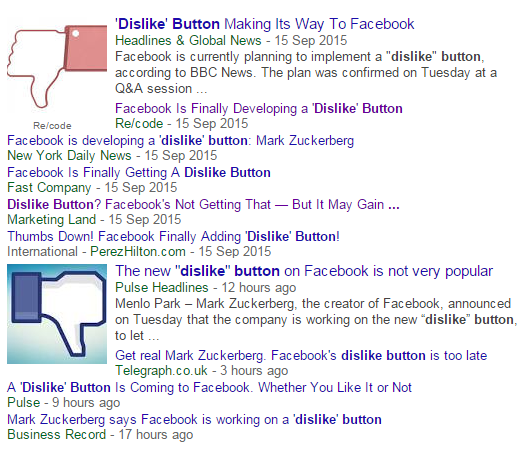
Stand down, cynics and haters. As it turns out, reports claiming Facebook was finally introducing a “dislike” button weren’t quite correct.
The story comes from an announcement made by Mark Zuckerberg at a Facebook HQ Q&A on Tuesday, when he said:
“People have asked about the ‘dislike’ button for many years. Today is a special today because today is the day where I actually get to say we are working on it and are very close to shipping a test of it.”
So we can expect a snarky thumbs down button, to be used on sickening baby photos and Britain First memes, right? Sadly, probably not.
Zuckerberg went on:
“We didn’t want to just build a Dislike button because we don’t want to turn Facebook into a forum where people are voting up or down on people’s posts. That doesn’t seem like the kind of community we want to create. You don’t want to go through the process of sharing some moment that’s important to you in your day and then have someone down vote it. That isn’t what we’re here to build in the world.
“But over the years of people asking for this, what we’ve kind of come to understand is that people aren’t looking an ability to downvote other people’s posts. What they really want is to be able to express empathy.
“Not every moment is a good moment, right? And if you are sharing something that is sad, whether it’s something in current events like the refugee crisis that touches you or if a family member past away, then it might not feel comfortable to Like that post. But your friends and people want to be able to express that they understand and that they relate to you.
“So I do think that it’s important to give people more options than just Like as a quick way to emote and share what they’re feeling on a post, so we’ve been working on this for a while. It’s surprisingly complicated to make an interaction that you want to be that simple. But we have an idea that we think we’re going to be ready to test soon, and depending on how that does, we’ll roll it out more broadly.”
(Thanks to TechCrunch for the transcription.)
Zuckerberg actually gave a very similar response at a Q&A back in December, when he said the company was considering alternatives to liking posts, but rejected the idea of a “dislike” button: “We don’t think that’s good for the world. We’re not going to build that.”
There’s a lot to unpack here. First, that reference to “upvoting” in the quote above appears to be a dig at link aggregation site Reddit, which has come under fire for its toxic culture over recent months.
Second is Zuckerberg’s assertion that people don’t want a “dislike” button, and that even if they do, he isn’t willing to build such a negative functionality into the social network. This seems to tie into Facebook’s notion that it should have control over how users operate on the site – it even tried to manipulate their emotions by filling timelines with “happy” or “sad” content in what turned out to be a very controversial experiment. This attempt to control users’ response to posts may well backfire, as it seems likely that, even if the new button is intended to help you “emote” with friends and family, some users will use it as a dislike button anyway.
Finally, Zuckerberg is still tight-lipped about what exactly this new button will be or look like. Some have guessed that Facebook might mimic messaging app Slack’s use of emoji to allow users to react to messages. (I approached Facebook for comment, but was told that the company isn’t releasing any further details at the moment.)
Despite repeated assertions that it’s off the cards, Facebook seems unwilling to totally ditch the phrase “dislike button”. We can imagine the message might have come from the PR department:

“Emotebutton” doesn’t have quite the same headline-friendly ring to it, does it.



